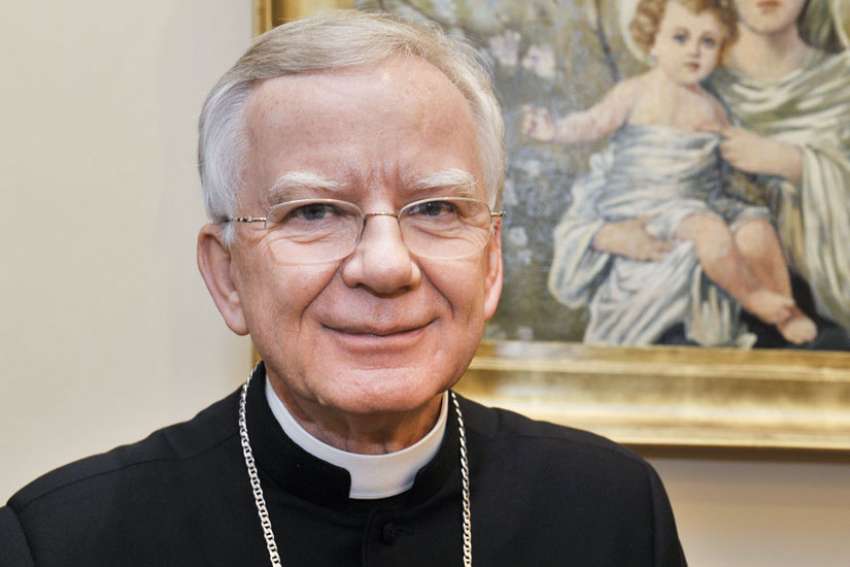“Thanks to Cardinal Karol Wojtyla, later St. John Paul II, the message of mercy became very important for the world. And this is a message really close to Pope Francis, too,” Archbishop Jedraszewski told CNA.
Krakow is a major centre of the Chaplet of Divine Mercy devotion, based on private revelations of Jesus Christ to St. Faustina Kowalska. It hosts Sister Faustina's convent and a shrine dedicated to Divine Mercy. St. John Paul II was himself a devotee and a popularizer of the Divine Mercy.
But the devotion itself began in the Archdiocese of Lodz, Archbishop Jedraszewski's previous assignment.
“It is really symbolic that I am coming from Lodz, where the Divine Mercy devotion began, to Krakow, where the devotion flourished. In the Lodz cathedral, Sr. Faustina saw Jesus who told her to enter the convent in Warsaw. The beginning of her spiritual life started in Lodz.”
For this reason, he added, “I feel committed to prolong this mission of mercy in Krakow, even to welcome all of the people coming to Krakow to pray over Sr. Faustina tombs, and actually touch the places Sr. Faustina lived.”
Archbishop Jedraszewski leads the archdiocese that at one time was headed by Cardinal Wojtyla, elected Pope John Paul II in the 1978 conclave. The archbishop recalled his friendship with the late Pope.
The new archbishop of Krakow said that their relationship started back in 1975, when he was living at the Polish College in Rome to study philosophy at the Pontifical Gregorian University.
“Cardinal Wojtyla used to come often to Rome, and stayed at the same college,” he said. “Cardinal Wojtyla was really interested in young Polish students, he spent much time with them, and so he did with me,” he recounted. “As I was studying philosophy, a subject he was very fond of, there were many possibilities to talk and discuss with him about philosophy.”
After Cardinal Wojtyla was elected Pope, Archbishop Jedraszewski kept a personal correspondence with him, “in particular when I was appointed bishop, since John Paul II always wanted Polish bishops who passed in Rome to spend a lunch or a dinner with him.”
The installation Mass of Archbishop Jedraszewski came in a favorable moment for Polish Catholicism. The latest figures of the Polish Church’s yearbook show a slight increase in the numbers of Sunday Mass attendance, as well as the number of communicants. About 40 percent of Poles attend daily Mass, while about 17 percent receive Holy Communion each Sunday.
The research also stressed the strong commitment of lay people in the Church. In Poland there are some 60,000 organizations involving about 2.5 million people.
Archbishop Jedraszewski told CNA that World Youth Day 2017 was “a convincing testimony that Poland cannot be considered a de-Christianized country.”
He noted that the statistics indicate growth not only in the traditionally devout southern Poland, but also in Lodz, a “highly secularized area.”
He concluded that “in the end, we may say that there is an increase of faith in Poland. On the other hand, it is true that challenges given from the secularizing trends are big.”
Archbishop Jedraszewski raised the issue of secularization with Pope Francis, during the Polish bishops’ meeting with the pontiff July 27. During that meeting, Pope Francis stressed the danger of gender ideology.
The archbishop also saw this approach to gender as a threat. He said Benedict XVI had affirmed gender theory as more dangerous than Marxist and Communist ideology because “it breaks with the anthropological vision of what the man his according the work of the Creator God.”
“God created the man as male and female, while gender ideology does everything possible to cancel differences between man and woman,” Archbishop Jedraszewski said. “This is absurd from a biological point of view, and it does not deals just with the human being: gender ideology has dramatic consequences in social life and in current culture.”
In the end “we cannot be open to this ideology, that is profoundly against God the Creator and against everything Christ himself taught us.”
(Story from the Catholic News Agency)


